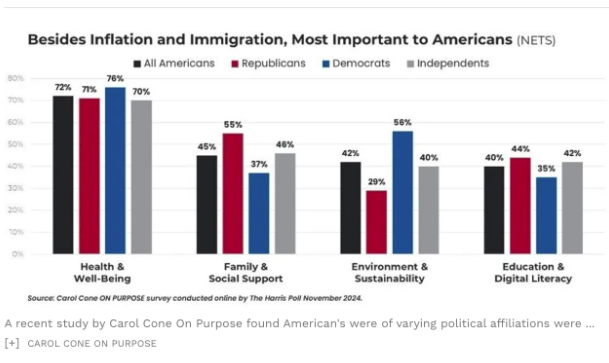Brief • 4 min Read
Gen X Can’t Afford To Retire, Sober-Curious Holiday Parties, Doing CSR That Isn’t Woke, and When Honesty Isn’t The Best Policy.
The latest trends in society and culture from The Harris Poll
It wasn’t the best year for corporate social responsibility. As ESG and DEI programs rolled back in droves by politics-fearing boardrooms, perhaps Americans might want firms in their box, just making good products and lowering prices.
Well, partially. Today, (61%) of Democrats support businesses taking on a more prominent role in addressing social issues, whereas only (33%) of Republicans say so. However, there are areas where bipartisan support emerges, most notably in wellness. Nearly three-quarters (72%) agree that companies should focus on health and well-being, and more than half of Republicans prioritized family support.
This is according to our new study with Carol Cone ON PURPOSE, featured in Forbes this week. The message to companies: focus on issues that matter to your employees and bring social benefits to society.
We have four new stories this week:
- Gen X, “the forgotten generation,” can now forget retiring (with Bloomberg).
- The dying tradition of holiday parties, thanks to Gen Z values (with Axios).
- How do we be a CSR-driven firm without being labeled “woke”?
- When it’s ok not to be honest at work (with Express Employment Professionals).
Gen X Says, “Forget Retirement”: Bloomberg-Harris Poll
It is hard to believe that Pearl Jam CDs gave way to 401(k)s, but as Gen X enters retirement, many feel the economic pressure to keep working, our new survey with Bloomberg shows.
- Still smells like Teen Spirit: Only (43%) of Gen X Americans said they can afford to retire at age 65, and for those without a 401(k), (26%) said they don’t expect to retire at all.
- (73%) of employed Gen Xers said they anticipate working longer to afford retirement, while (38%) believe they’ll likely have to work their entire lives.
- Especially as (58%) of Gen X believe their retirement plans couldn’t withstand another global crisis.
- There’s little confidence that Social Security will backstop their lifestyles: (76%) said politicians have no idea how to fix Social Security.
Takeaway: Gen X entered the job market during the shift to employer-provided, but largely employee-funded, 401(k)-type investment accounts. Now, the tradeoff between the freedom to make one’s own investment choices versus the risk of a retirement shortfall is coming into sharp relief. “Generation X is undoubtedly the most stressed-out generation about retirement,” said David Blanchett, head of retirement research for PGIM DC Solutions. “The way we plan for retirement is structurally changing, with more personal responsibility, and Gen X was the first generation to deal with that independently.”
Company Holiday Parties Are Falling Out Of Fashion: Axios-Harris Poll
If you expect your office party to go full Santa Con, you might be disappointed this year. Our latest research from Harris Thought Leadership & Futures practice in Axios finds the traditional corporate holiday bash is falling out of fashion.
- What party? Just half (48%) of employed Americans say their workplaces now hold regular, annual, in-person holiday parties.
- Virtual parties aren’t filling the gaps: Only (9%) say they have an annual virtual party.
- Gen Z passes on alcohol-soaked bashes: (42%) of Gen Z workers would prefer no alcohol or a moderate amount at a holiday party (v. all workers: 37%).
- But overall, cash is king: (79%) of workers surveyed said they’d prefer a bonus over a party.
Takeaway: “What is the goal of the holiday party? Is it to let off steam and have too much to drink? Or is it to get to know each other better and bond and have these more meaningful interactions with colleagues – that’s more what you see with Gen Z,” says Libby Rodney, chief strategy officer at The Harris Poll.
How to Be Socially Responsible and Not Woke?: ON PURPOSE-Harris Poll
Our new study with Carol Cone in Sustainable Brands and Forbes (mentioned above) shows that companies that continue directing their resources and influence to create meaningful impact despite more significant “woke” headwinds likely expected by the incoming administration.
- Americans are more bearish on firms speaking out: (46%) of Americans call on businesses to take on a more significant role in addressing social issues under the incoming administration. (Harris had this number tracked in the high sixties as Biden took office).
- So, what exactly do consumers expect in this next era? Four in five want companies to focus more on significant issues facing the U.S. (e.g., healthcare, jobs, etc.) and local issues in communities during the next administration (82%).
- When asked to prioritize social issues, health and well-being were the top priority (72%), even across political affiliations. It was followed by family/social support issues and environmental concerns (45% and 42%).

Takeaway: “Companies that lead with authenticity and purpose, directing their resources and influence to create meaningful impact, will be the ones that not just survive but grow and remain resilient during the upcoming administration,” says Carol Cone, founder. “Our research shows that the U.S. public is ready for this leadership – now, it’s up to business to deliver.”
There’s a Place for a White Lie in Workplace Ethics: Express Employment Professionals-Harris Poll
While honesty is often touted as the best policy, it is possible to be too honest in the workplace, according to our new survey with Express Employment Professionals.
- There is a line on workplace honesty: Over half (54%) of hiring managers don’t agree that employees can never be “too honest” at work.
- Employees beware: Hiring managers say employees can be “too honest” when it comes to sharing personal information about colleagues or themselves (65%), criticizing colleagues or the company (53%), gossiping or spreading rumors (51%), and venting about colleagues or projects (46%).
- Too much honesty can have damaging impacts: (65%) feel being “too honest” at work will damage an employee’s professional reputation.
- Mixed messaging: While (70%) of hiring managers believe employees should feel comfortable discussing personal issues, (67%) say talking about personal matters at work hinders productivity.
Takeaway: “While honesty is crucial, the wisdom to communicate thoughtfully is equally important,” said Express Employment International CEO Bill Stoller. “Discerning what to share and keep private is key in a professional setting. It’s important to remember that some personal situations are best discussed with confidantes outside of work.”
Subscribe for more Insights
Subscribe to our newsletter for the latest trends in business, politics, culture, and more.
Related Content









